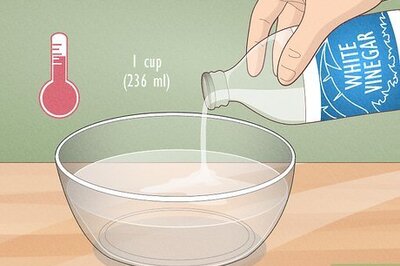
views
LONDON/SYDNEY: World stocks slipped further on Friday and save havens got a fillip as jitters over a rising global COVID-19 infection rate and next week’s U.S. presidential election weighed on sentiment.
A strong central bank-fuelled bounce back from the initial pandemic slide earlier in the year has faltered this week with concerns about an even worse second wave of infections, particularly in Europe, taking the froth off markets.
World stocks were down 0.3% at 0717 GMT, tracking weakness in Asia and giving a nod to a likely weaker open on Wall Street later in the day. Gold rose, with spot prices climbing 0.2% to $1,871 an ounce.
In Europe, the blue-chip EuroSTOXX 50 was down 0.6% to take its weekly loss to 6.8% and leaving it at levels last seen in late May.
MSCI’s broadest index of Asia-Pacific shares outside of Japan was last down 1.2%, on track to break a run of four straight weeks of gains.
U.S. stock futures, meanwhile, were pointing to drops of around 1.4% to 1.9%.
“New lockdowns across Europe are being harshly repriced by markets,” Barclays equity strategist Emmanuel Cau said in a note to clients.
“With complacency going fast, this dip could end up offering another good entry point, but a lot depends on the election outcome and timing of the results.”
The weak sentiment dragging Europe lower came despite the previous day’s pledge for more help from the European Central Bank when it next meets in December to help counter the potential economic hit from the pandemic.
This week has seen global coronavirus cases rose by over 500,000 for the first time, with France and Germany prepping fresh lockdowns.
In response, analysts expect an expansion and extension of the ECB’s Pandemic Emergency Purchase Programme, a lower deposit facility rate, and even more generous lending terms for banks in December.
The announcement sent the euro sliding to a four-week low of $0.1648 before recovering slightly on Friday to trade at $1.1668, down around 0.4% since the start of the month.
The dollar index, meanwhile, held steady, bolstered by a solid session on Wall Street overnight after strong quarterly reports from some of the leading tech giants and data showing the U.S. economy grew at a record annualised pace of 33.1% in the third quarter.
“Even with the rebound, U.S. output remains 3.5% below its pre-COVID levels. The path towards recovery is much less clear from here, especially as the number of virus cases grows and there are near-term impediments to a fiscal deal,” wrote ANZ analysts in a note.
Brent crude was also flat in early Europe deals while U.S. crude was up 0.2% at $36.27.
Disclaimer: This post has been auto-published from an agency feed without any modifications to the text and has not been reviewed by an editor
Read all the Latest News and Breaking News here



















Comments
0 comment